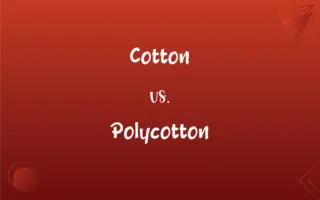Table Salt vs. Kosher Salt: What's the Difference?
Edited by Aimie Carlson || By Harlon Moss || Published on January 18, 2024
Table salt is finely ground, often iodized, and contains anti-caking agents; kosher salt has larger, coarser grains and no additives, used for koshering meat.

Key Differences
Table salt, finely ground with anti-caking agents for free-flowing consistency, contrasts with the coarser, flake-like structure of kosher salt, which is additive-free.
Table salt's fine texture dissolves quickly, ideal for baking, while kosher salt's larger crystals offer better control for seasoning, preferred in cooking.
Despite chemical similarity (NaCl), table salt tastes sharper due to its density, whereas kosher salt provides a milder flavor, enhancing foods without overpowering.
Table salt often contains iodine, addressing dietary deficiencies, unlike kosher salt, which is typically non-iodized, appealing to those avoiding additives.
Table salt is a general-purpose seasoning, while kosher salt's name and qualities stem from its use in Jewish dietary laws for extracting blood from meat.
ADVERTISEMENT
Comparison Chart
Grain Size
Fine
Coarse
Additives
Often contains iodine and anti-caking agents
No additives
Dissolving Speed
Dissolves quickly
Dissolves slower
Taste Intensity
Sharper
Milder
Cultural Significance
General-purpose seasoning
Used in koshering meat
ADVERTISEMENT
Table Salt and Kosher Salt Definitions
Table Salt
Table salt is a finely ground salt used in cooking.
I added a pinch of table salt to the soup.
Kosher Salt
Kosher salt has larger, coarser grains than table salt.
I used kosher salt for seasoning the steak.
Table Salt
Table salt often contains iodine and anti-caking agents.
Table salt in my shaker flows freely due to anti-caking agents.
Kosher Salt
Kosher salt got its name from its use in the koshering process.
Kosher salt is essential for properly koshering meats.
Table Salt
Table salt is known for its fine texture and quick dissolution.
The table salt dissolved instantly in the dressing.
Kosher Salt
Kosher salt offers better control in seasoning due to its grain size.
I sprinkled kosher salt on the vegetables for a subtle taste.
Table Salt
Table salt is commonly used in baking for even distribution.
I measured a teaspoon of table salt for the cookie dough.
Kosher Salt
Kosher salt does not usually contain iodine or anti-caking agents.
I choose kosher salt for its natural flavor and lack of additives.
Table Salt
Table salt is a ubiquitous seasoning found in most households.
I always have a box of table salt in my pantry for everyday cooking.
Kosher Salt
Kosher salt is preferred in many culinary applications for its texture.
The chef recommended kosher salt for brining the chicken.
FAQs
Are there additives in table salt?
Yes, it often contains iodine and anti-caking agents.
How does the grain size of table salt compare to kosher salt?
Table salt has a finer grain, while kosher salt is coarser.
Does kosher salt contain iodine?
No, it usually does not contain iodine.
What is kosher salt?
A coarse, flake-like salt, without additives, used in koshering meat.
Why is kosher salt preferred in cooking?
Its coarser grains offer better control in seasoning.
What is table salt?
A finely ground salt, often iodized, used in everyday cooking.
Is table salt better for baking?
Yes, its fine texture ensures even distribution in baking.
Can table salt and kosher salt be used interchangeably?
They can, but adjustments in quantity may be necessary due to grain size differences.
Is kosher salt healthier than table salt?
Health differences are minimal, but kosher salt has no additives.
Can kosher salt be used in baking?
Yes, but it might not dissolve as uniformly as table salt.
Can kosher salt prevent clumping in humid conditions?
Yes, its lack of anti-caking agents makes it less prone to clumping.
Does the size of kosher salt grains affect its dissolving speed?
Yes, it dissolves slower than fine table salt due to larger grains.
Is table salt more suitable for high-precision recipes?
Yes, its consistent grain size allows for precise measurement.
Does table salt taste different from kosher salt?
Table salt tastes sharper due to its density, while kosher salt is milder.
Is table salt more widely available than kosher salt?
Yes, it's more commonly found in households and stores.
Is table salt considered less natural than kosher salt?
Due to its added iodine and anti-caking agents, it's seen as less natural.
Can both salts be used for preserving food?
Yes, both can be used, but kosher salt is often preferred for its pure taste and texture.
Why is table salt commonly iodized?
To prevent iodine deficiencies in diets.
Why is kosher salt named so?
It's named for its use in the koshering process, which involves drawing blood from meat.
Do chefs prefer kosher salt for seasoning meats?
Many chefs prefer it for its texture and ease of handling.
About Author
Written by
Harlon MossHarlon is a seasoned quality moderator and accomplished content writer for Difference Wiki. An alumnus of the prestigious University of California, he earned his degree in Computer Science. Leveraging his academic background, Harlon brings a meticulous and informed perspective to his work, ensuring content accuracy and excellence.
Edited by
Aimie CarlsonAimie Carlson, holding a master's degree in English literature, is a fervent English language enthusiast. She lends her writing talents to Difference Wiki, a prominent website that specializes in comparisons, offering readers insightful analyses that both captivate and inform.






































































